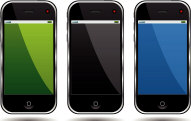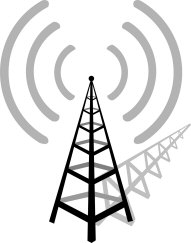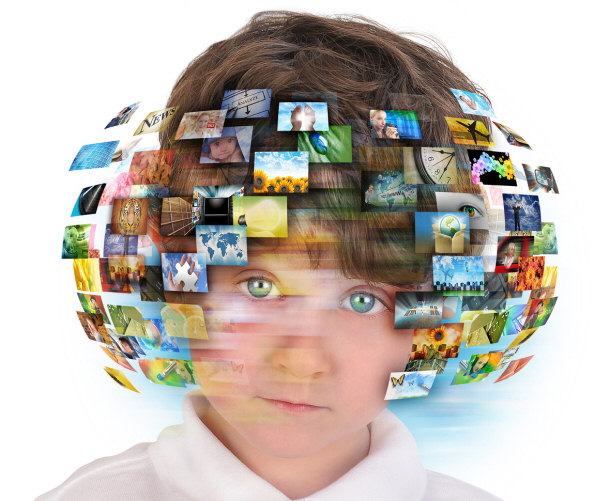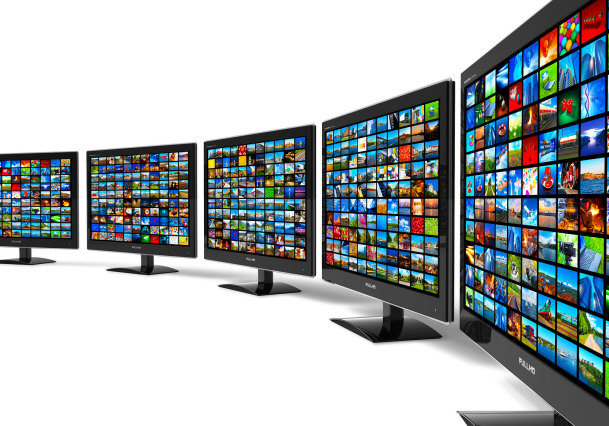|
| By: anonymous - at April 4, 2013 |
Latest Advances in Communication Technology
Communication Advancement of Our Era
 Our society has come a long way with our means of communication. We've come from
a cup and string used to communicate to high-tech cell phone towers that
transmit signals into our pockets. 150 years ago, if someone made the claim that
our society was going to have endless information at our fingertips; they would
have thought you were sick in the head. How have we come so far with these
developments? It seems almost every day something new comes out, out-dating the
old and turning the value of it to basically nothing. On any given day, we have
thousands of television shows we can pick through to watch. They keep most of
their breakthroughs a secret though. My understanding is that we only get to see
as much as corporations and the government want to show us. Advancement in these
industries will continue until they become outdated and useless. Our society has come a long way with our means of communication. We've come from
a cup and string used to communicate to high-tech cell phone towers that
transmit signals into our pockets. 150 years ago, if someone made the claim that
our society was going to have endless information at our fingertips; they would
have thought you were sick in the head. How have we come so far with these
developments? It seems almost every day something new comes out, out-dating the
old and turning the value of it to basically nothing. On any given day, we have
thousands of television shows we can pick through to watch. They keep most of
their breakthroughs a secret though. My understanding is that we only get to see
as much as corporations and the government want to show us. Advancement in these
industries will continue until they become outdated and useless.
Cell Phones
 Let's begin with the most practical technological advancement that has been
created. Cell phones have blown up since people realized that they were able to
contact anyone at anytime. They have been crucial in reducing crime, spreading
news, and staying in touch with family and friends. Truly, cell phones are an
incredible networking tool, but where did it all start? In 1843, Michael Faraday
submitted the claim that, "space can conduct electricity" (Keith). All the other
scientists in this era called him and his colleagues crackpots for beginning one
of the most important studies to affect our generation. People tend not to
believe things until they see them with their own eyes. Our society might even
derail if the valuable tool happened to disappear. Let's begin with the most practical technological advancement that has been
created. Cell phones have blown up since people realized that they were able to
contact anyone at anytime. They have been crucial in reducing crime, spreading
news, and staying in touch with family and friends. Truly, cell phones are an
incredible networking tool, but where did it all start? In 1843, Michael Faraday
submitted the claim that, "space can conduct electricity" (Keith). All the other
scientists in this era called him and his colleagues crackpots for beginning one
of the most important studies to affect our generation. People tend not to
believe things until they see them with their own eyes. Our society might even
derail if the valuable tool happened to disappear.
The Use of Radio Frequencies
 Radios were the starting point of figuring out how to transmit information
amongst each other. If it weren't for radio frequencies, cell phones would be
fancy music players with no real importance or value. In 1921, the police from
Detroit, Michigan developed a radio frequency to use in their squad cars. This
was the most basic form of communicating without being in the same room. It was
most commonly used by convoys who needed to be able to talk to each other on the
open road. The radio frequency for the Detroit Police operated on about 2 MHz of
energy (Keith). They ended up not even using it due to interference on their
channel. We have developed our technology to be thousands of times stronger in
only one hundred years. My computer and even some newer cell phones now run on
GHz. One GH is 1000 MHz! Radios were the starting point of figuring out how to transmit information
amongst each other. If it weren't for radio frequencies, cell phones would be
fancy music players with no real importance or value. In 1921, the police from
Detroit, Michigan developed a radio frequency to use in their squad cars. This
was the most basic form of communicating without being in the same room. It was
most commonly used by convoys who needed to be able to talk to each other on the
open road. The radio frequency for the Detroit Police operated on about 2 MHz of
energy (Keith). They ended up not even using it due to interference on their
channel. We have developed our technology to be thousands of times stronger in
only one hundred years. My computer and even some newer cell phones now run on
GHz. One GH is 1000 MHz!
The system we use now for communication divides our area code into multiple
cells. A cell is the area that a radio tower covers. All the cell towers are
linked together depending on your carrier. The towers give us the potential to
connect to other cell phones thousands of miles apart from each other. A cell
phone is a full-duplex device. This means that two people are able to speak at
the same time and still hear each other. Before full-duplex devices were
half-duplex devices, such as the CB radio and walkie-talkie. These devices were
only able to transmit signals as far as their limited range was. Only one person
was able to talk while another listened (Brain, 2).
When communication between human beings was at it's earlier stages of
development, we were using only one channel to send and receive information.
This one channel was capable of having one person talking and one person
listening individually. The methods developed quickly, a cell phone carrier now
receives about "832 frequencies per city," (Brain, 3). Each cell phone uses it's
own channel, which is referred to as full-duplex. It's almost unbelievable how
far we have developed our means of long-term communication.
Smart Phones
 The newest development in the cell phone industry is the smart phone. I am sure
you have heard of the iPhone, Android phones, Windows Phones and Blackberries.
Based on my personal opinion, Android phones are the best route to go. They have
the most maneuverability, and they support many more applications. Smart phones
allow high-speed internet connections to be transmitted through the network for
web browsing, e-mail applications, and social networking. Not only have we
managed to connect the human race through radio frequencies, but we've also
found a way to connect almost everybody to the internet in the palm of their
hand. The I phone 5 has been clocked in at 1.3GHz (Humphries)! The processor in
that cookie is exceedingly faster than the Apple's first mass produced PC. Here
are the specs: "4.77 Mhz, 16kb of ram, 160kb floppy disk, and a mono 8 inch
display," (Dundun2007). The increased speed in computers and cell phones is
undeniable and hard to believe. A device that fits inside the palm of your hand
is now a thousand times faster than a device that took up your whole desk. What
would you do without that cell phone in your pocket? You would be quite
devastated. I have lived for a while without a cell phone, although it really
isn't the end of the world, it is inconvenient. You could lose your job because
of an important call you needed to receive. Maybe you missed one of the biggest
opportunities of your life, all because you didn't have that tiny little device
in your pocket to notify you. Our society has become dependent on these devices
to keep us in contact with the world outside of us. The newest development in the cell phone industry is the smart phone. I am sure
you have heard of the iPhone, Android phones, Windows Phones and Blackberries.
Based on my personal opinion, Android phones are the best route to go. They have
the most maneuverability, and they support many more applications. Smart phones
allow high-speed internet connections to be transmitted through the network for
web browsing, e-mail applications, and social networking. Not only have we
managed to connect the human race through radio frequencies, but we've also
found a way to connect almost everybody to the internet in the palm of their
hand. The I phone 5 has been clocked in at 1.3GHz (Humphries)! The processor in
that cookie is exceedingly faster than the Apple's first mass produced PC. Here
are the specs: "4.77 Mhz, 16kb of ram, 160kb floppy disk, and a mono 8 inch
display," (Dundun2007). The increased speed in computers and cell phones is
undeniable and hard to believe. A device that fits inside the palm of your hand
is now a thousand times faster than a device that took up your whole desk. What
would you do without that cell phone in your pocket? You would be quite
devastated. I have lived for a while without a cell phone, although it really
isn't the end of the world, it is inconvenient. You could lose your job because
of an important call you needed to receive. Maybe you missed one of the biggest
opportunities of your life, all because you didn't have that tiny little device
in your pocket to notify you. Our society has become dependent on these devices
to keep us in contact with the world outside of us.
What will the average American do when a disaster happens? My guess is pull
out their cell phone and try to call somebody for help or spread the news. When
the cell phone towers are jammed, people become frantic and feel excommunicated
from the world. A good example of this is during the events of September 11,
2001 (Chen). Nobody could make phone calls because everybody was trying to use
the service at the same time; therefore, the system became inaccessible and
useless. Cell phones can be a smart precautionary measure, but always make sure
you have a backup plan. Although uncommon, the whole entire cell phone system is
prone to become completely jammed at any given moment. They have been very
helpful with saving lives when they do work, but in the event of a serious
catastrophe, your cell phone is not a very good back-up plan.

Cell phones are the newest, most useful improvement that our generation has
had the luxury to use. We've developed towers and filled up most of God's green
earth with cell phone traffic. They started out on a basic frequency and were
not affordable. They are so common and affordable nowadays, almost every
American has one in their pocket. Most of them now are stronger than an older
computer. Remember to plan a more detailed reaction to catastrophe than just
pulling out your cell phone. Chances are if it's going down, your cell phone
probably won't work. Cell phones have created their own industry and have been
successful with connecting people together on a global level.
Television
 Currently, we have access to thousands of television channels in the palms our
hands. When TV first came out, there were about 5 channels. A television has
become a common household necessity for millions of people around the world.
Everyone seems to enjoy such a broad access to information and entertainment.
However, television has been known to rob us of our individuality. It makes
common generalizations and suggestions that subconsciously work themselves into
our psyche. There have been a handful of studies performed that prove that
television has harmful effects on the human body. Even with the negative health
consequences being known to the public, television still continues to offer a
steadily increasing amount of consumers. The television is one of the best known
ways to advertise for your business or product. Nobody likes to watch
commercials though so we now have the power to fast forward through them with
DVR services. Digital Video Recorders or DVRs are a service cable companies have
developed which allow you to record any television program or movie in advance.
This section of the article will touch on the history of television, how it came
to be where it is now, some negative effects that television has on our brains,
and television marketing at it's best. Currently, we have access to thousands of television channels in the palms our
hands. When TV first came out, there were about 5 channels. A television has
become a common household necessity for millions of people around the world.
Everyone seems to enjoy such a broad access to information and entertainment.
However, television has been known to rob us of our individuality. It makes
common generalizations and suggestions that subconsciously work themselves into
our psyche. There have been a handful of studies performed that prove that
television has harmful effects on the human body. Even with the negative health
consequences being known to the public, television still continues to offer a
steadily increasing amount of consumers. The television is one of the best known
ways to advertise for your business or product. Nobody likes to watch
commercials though so we now have the power to fast forward through them with
DVR services. Digital Video Recorders or DVRs are a service cable companies have
developed which allow you to record any television program or movie in advance.
This section of the article will touch on the history of television, how it came
to be where it is now, some negative effects that television has on our brains,
and television marketing at it's best.
In 1947 the amount of televisions distributed across America was measurable
by only thousands. In 1955, an estimated 50% of Americans owned a television
set. By 1990, television became so increasingly popular that 98% of Americans
bought a television set for their home. That's an advance of over 1000% profit
for television networks. An unfathomable jump-start in their consumer network
followed by a continual renewal of interest by highly satisfied consumers.
Television took flight when RCA hired a Russian scientist and invested 50
million dollars into developing it. The WWII struggle caused the FBI to get
involved with the film industry. A report issued by the FBI, "Counterattack: The
Newsletter of Facts on Communism," blacklisted almost everyone who was involved
in the growing industry. The government wanted to stop television from becoming
popular because it affected their control over the people. The man leading the
campaign for this made a fool of himself on national television. After that,
legal problems ceased and allowed television to grow.
The two major networks that were available for public viewing when TV hit the
streets were CBS and NBC. ABC Network came along shortly after those two. NBC
and CBS mostly aired dramatic movies and news programs that all eventually went
off the air. Shortly following it's arrival, NBC began competing with the
newspapers for being the country's primary source of news. Consumers at the time
were more concerned with watching shows that were not as complicated and hard to
follow. The most popular shows among the consumers were situational comedies
like I Love Lucy. Sitcoms captured the element of drama, combined it with
comedy, and eliminated the need to pay attention in order to understand what was
going on. Consumers craved mindless entertainment to pass the time, so the
television networks made it happen.

Right when the television was made available to the public, your basic 5
channels consisted of NBC, CBS, ABC, a public broadcasting channel, and maybe a
few independent channels. All of the programs on the main networks were designed
to pull in a massive amount of viewers. These main channels have continued to
compete with each other heavily since television became popular with the public.
Now we have thousands of television shows at our disposal. Currently, NBC, CBS,
and ABC all broadcast on more than one channel.
Cable television is what gave these three large companies a run for their
money. All you needed to do was buy a cable box and install it to your
television. Many new independent networks popped up including FOX, PBS, C-Span,
ESPN, Nickelodeon, HBO, and CNN. Cable made many more channels available to the
general public than ever before. It's amazing how we have so many options on the
television, but it's a struggle still to find a quality program that's worth
spending your time watching.
All television productions viewed on national television were produced in
black-and-white up until 1964. Color television made the display on the
television open to much more vivid and artistic work. It also drew in another
large amount of people to the network of television consumers (Stephens).
Television has been used as a tool for not only information, but also
constant and flamboyant misinformation. Commercials will commonly attempt to
trick you into buying items that are worthless. Not long ago, ads would get away
with selling you one ring-tone for a recurring fee of 10 dollars a month on your
cell phone bill. They just did not tell you their product was going to cost
money until you received the actual bill. When I was very young, I had the
interpretation that everything that was featured on the television was
trustworthy. It did not take me long to learn otherwise.

Brain-washing is a serious concern for people who dedicate their lives to
their television sets. A certain television program can change how you look at
yourself and your environment. Television is notoriously known for leaving
impressions within your subconscious. This means that it is capable of
developing opinions and forming ideas in your head without you even knowing that
it's happening. Have you ever watched something on the television and
immediately wished you had not? It could have been a commercial or a
particularly upsetting horror film. Well, it's too late, you already watched it,
and the cogs are now turning in your brain. This is an unfortunate demise you
will run into with most television programs. The only way to avoid it is not to
subject your entity to television, but no one wants to do that.
Watching television has been proven to relax your mind into a hypnotic state.
This is why it is easy to fall asleep while the television is playing a program.
When you are in this state of mind, you are very susceptible to subconscious
invasion! The hypnotic state you are in makes your mind very open to suggestion.
The television is capable of altering ideas and beliefs that are in your head.
When you watch TV, it switches your body over to using the right side of your
brain. This side of your brain generates an emotional response instead of using
common sense. Spending too much time on this side of your brain will result in
having a less distinguished outlook on reality. Television has the potential to
fog up your brain's developed distinction between right and wrong (Haracz).
Although programs on the television have the potential to change things in
your subconscious, not all of them do. I refuse to believe that an
intellectually stimulating documentary on the Discovery Channel is going to mess
up your head; however, there are an increasing rate of troubling ads and
brain-washing campaigns you are somewhat forced into viewing on cable. Movies
and even some television shows also have the potential to make you think and
analyze things on a higher level too. Not nearly everything on television is
complete garbage. It is important to pay attention to the quality of the TV
programs you watch.
Watching television has the potential to make you smarter.

Advertisement agencies and marketers have been having a field day with
television. Television is currently the best way to get your product or business
noticed. The average time an American spends watching television every day is,
"four hours and thirty-nine minutes"(Stelter, 1). This allows such a huge window
of advertisement to almost the entire general public. A trick they use is
finding out what type of people watch a show at a certain time. Then they show
ads pertaining to the time of the day, what show it is, and likelihood of you
buying or becoming interested in the item. If you're a big-time company, getting
time on the air is not very difficult. Small businesses suffer from this because
they are usually incapable of affording enough airtime to make a difference in
their clientele. Advertising your product or business on television is a
sure-fire way to promote it and become recognized by thousands of people.
Television has introduced an entire new industry for growth in the last 100
years. It quickly sparked as soon as it became available and is now a common
household item. Television has been carefully monitored to fit the needs of the
average consumer. Networks for broadcasting have developed all over the world,
there are now hundreds of them. Many programs and advertisements have done a
successful job at prying into your subconscious. Advertising on television is a
must for any company who wishes to formulate a successful marketing campaign. It
can almost completely guarantee that the word gets out. The only downfall is the
cost where some prime-time advertising slots are very expensive. The television
seems to have become an astoundingly close friend to the average American in an
inexplicably short amount of time.
Bibliography
Brain, Marshall, Julia Layton, and Jeff Tyson. "How Cell Phones Work."
Howstuffworks.com. HowStuffWorks, 1998-2013. Web. 11 February, 2013. <//electronics.howstuffworks.com/cell-phone1.htm>
Chen, Bryan and Edward Wyatt. "F.C.C. details Storm-Related
Cell phone Problems." Nytimes.com. The New York Times Company, 31 October, 2012.
Web. 11 February, 2013. <//www.nytimes.com/2012/11/01/technology/fcc-details-cellphone-problems.php>
Dundun2007. "How Did the Computer Evolve and Where Did it All
Start - history lesson." Knowledgesutra.com. 11 April, 2007. Web. 11 February,
2013. <//www.knowledgesutra.com/discuss/tfscdm-computer-evolve-start-history-lesson.php>
Haracz, Martin. "The Effects of TV on the Brain." Erupting
Mind. 2013. Web. 21 February, 2013. <//www.eruptingmind.com/effects-of-tv-on-brain/>
Humphries, Matthew. "I phone 5 A6 chip clocked at 1.3GHz."
Geek.com. Ziff Davis, 27 Sep. 2012. Web. 11 February, 2013. <//www.geek.com/articles/mobile/iphone-5-a6-chip-clocked-at-1-3ghz-
20120927/>
Keith, Robert. "Cell Phone Timeline." Interactive Media Lab.
Keith Robert, 2004. Web. 11 February, 2013. <//iml.jou.ufl.edu/projects/fall04/keith/history1.htm>
Stelter, Brian. "Youths are watching, but less often on TV."
Nytimes.com. The New York Times Company, 8 February, 2012. Web. 22 February,
2013. <//www.nytimes.com/2012/02/09/business/media/young-people-are-watching-but-less-
often-on-tv.php?pagewanted=all&_r=0>
Stephens, Mitchell. "History of Television." Grolier
Encyclopedia. Web. 21 February, 2013. <//www.nyu.edu/classes/stephens/History%20of%20Television%20page.htm>
U.S. Department of Labor Statistics. "Focus on Prices and
Spending." U.S. Bureau of Labor Statistics. Web. 22 February, 2013. <//www.bls.gov/opub/focus/volume1_number4/cex_1_4.htm>
Gadgets
Latest Advances in Communication Technology
Smartphone
Explodes While Charging and Kills Man
Top 10 Modern Technologies That Make Life Easier
Best Cherry MX
Mechanical Key Switch
|